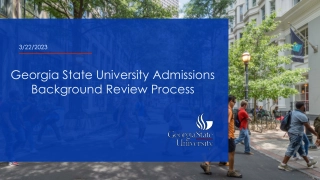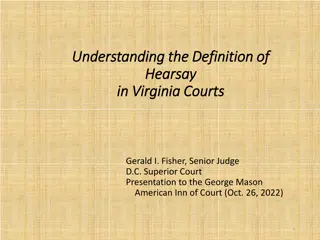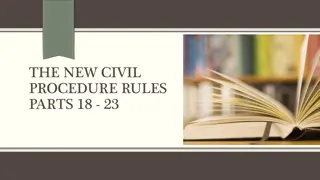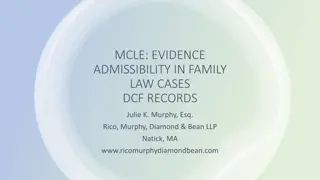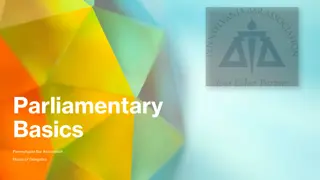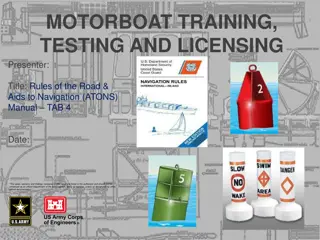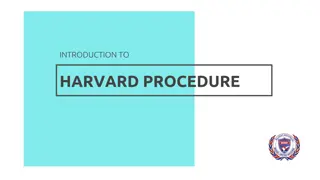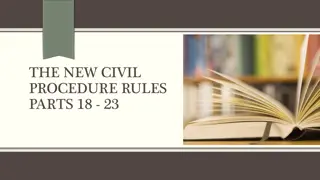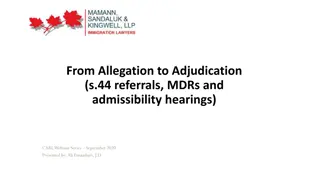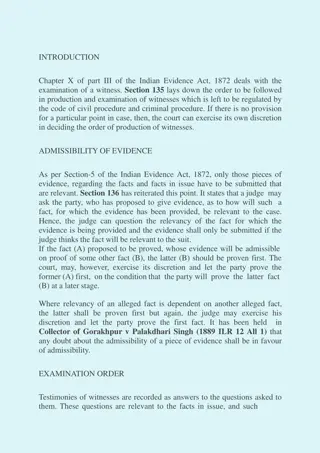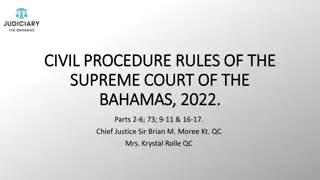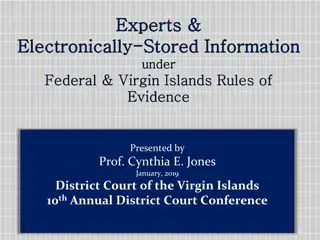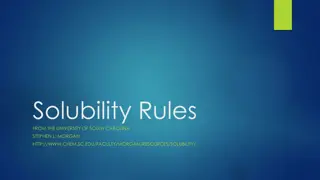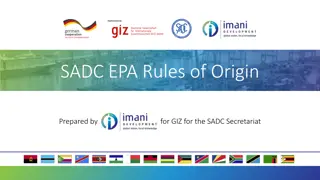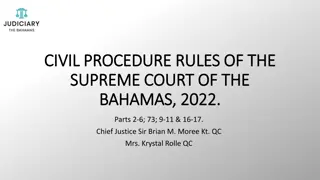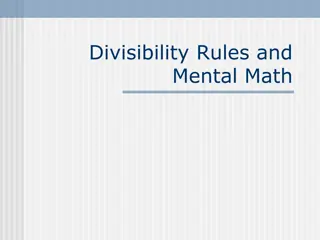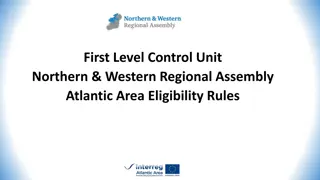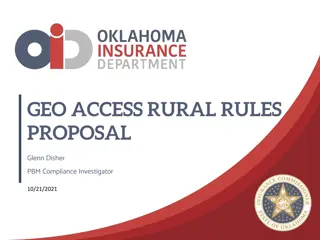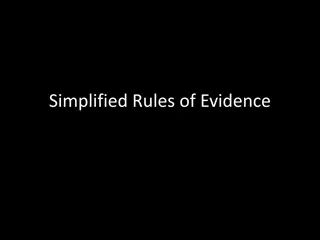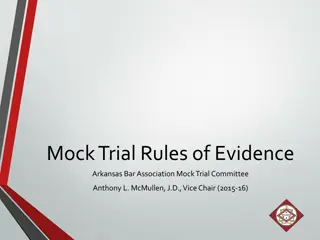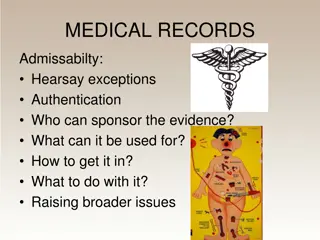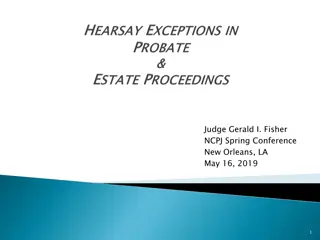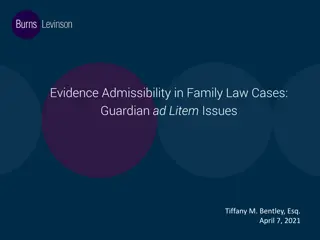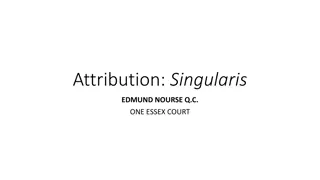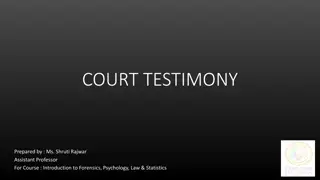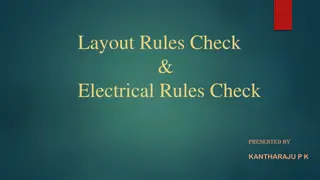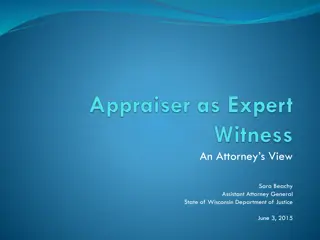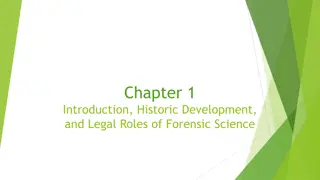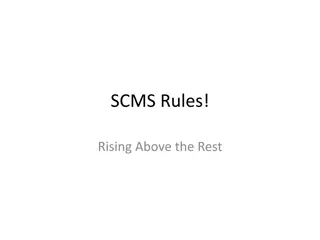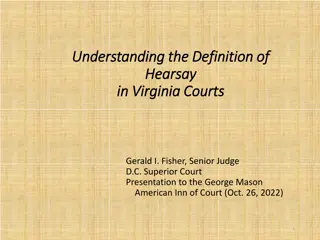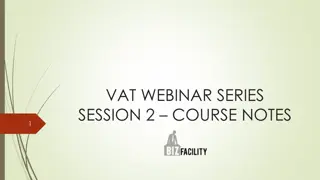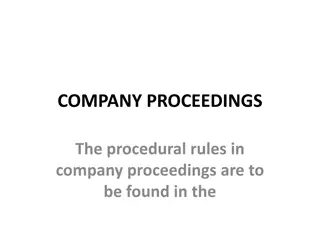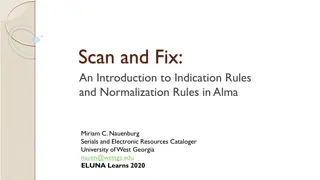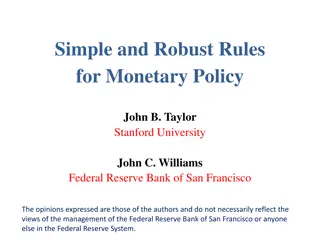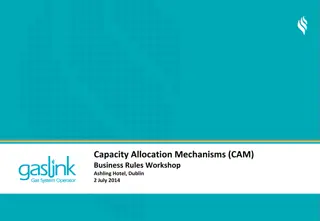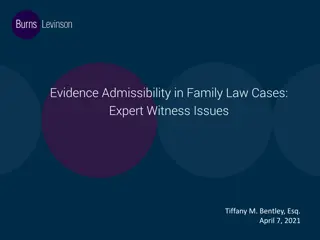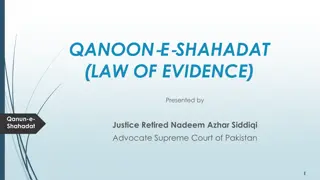Georgia State University Admissions Background Review Process
Georgia State University conducts a comprehensive Admissions Background Review (ABR) process to assess applicants' admissibility based on reported information and potential threats to the campus. The ABR Committee evaluates responses to specific admissions background questions, referring cases invol
1 views • 11 slides
Understanding the Definition of Hearsay in Virginia Courts by Gerald I. Fisher, Senior Judge
Preliminary principles and rules regarding hearsay in Virginia courts, including the effective date of the Virginia Rules of Evidence, application of rules in various trial scenarios, criteria for admissibility of evidence by trial judges, and reasons for the legal distrust of hearsay evidence. The
1 views • 78 slides
Understanding Civil Procedure Rules Parts 18-23
The new civil procedure rules cover various aspects such as counterclaims, additional claims, changes to parties, representative parties, miscellaneous rules, and rules regarding minors and patients. The overriding objective is to ensure cases are dealt with justly and at a proportionate cost, consi
1 views • 49 slides
Admissibility of Evidence in Family Law Cases & DCF Records
Explore the admissibility of evidence in family law cases and the handling of Department of Children and Families (DCF) records in civil proceedings. The regulations for releasing records, obtaining consent, and seeking court orders are detailed, emphasizing the importance of protecting the best int
1 views • 13 slides
Understanding Parliamentary Basics and the Purpose of Roberts Rules of Order
This content details the basics of parliamentary procedures, focusing on the purpose of Roberts Rules of Order in running meetings uniformly, facilitating business transactions, and protecting the rights of all members. It also highlights the hierarchy of rules, general rules of Robert, and the hist
0 views • 30 slides
Motorboat Training, testing, and licensing: Rules of the Road & Aids to Navigation Manual
This presentation covers essential information on motorboat training, testing, and licensing, focusing on rules of the road and aids to navigation. It includes details on navigation rules, the importance of following them to prevent accidents, and where the rules apply. The content also explains who
0 views • 34 slides
Harvard Procedure Guidelines and Rules for Model United Nations
In this guide, you will explore the rules and procedures specific to the Harvard Procedure in Model United Nations. It covers general rules, guidelines on resolutions and voting, language requirements, courtesy expectations, rules of procedure, motions, points of order, and parliamentary inquiries.
4 views • 20 slides
Understanding the New Civil Procedure Rules Parts 18-23
The new civil procedure rules cover various aspects like counterclaims, addition of parties, changes to case statements, representative parties, miscellaneous rules about parties, and rules regarding minors and patients. The overriding objective is to ensure cases are dealt with justly and at a prop
3 views • 49 slides
Legal Provisions on Admission and Confession in Criminal Proceedings
The content highlights key sections related to admission and confession in criminal proceedings. It defines admission and explains the relevance of inducement, threat, or promise in a confession. It also emphasizes restrictions on confessions made to a police officer. These sections play a crucial r
0 views • 28 slides
Section 44 Process in Immigration Adjudication
The process from allegation to adjudication in immigration cases involves Section 44 referrals, MDRs, and admissibility hearings under IRPA. Officers have discretion to write reports or issue removal orders based on inadmissibility opinions. Procedural fairness is essential, including providing deta
0 views • 19 slides
Examination of Witnesses under Indian Evidence Act, 1872
Chapter X of Part III of the Indian Evidence Act, 1872, outlines the process of examining witnesses, including the order of production and admissibility of evidence. Sections 135 to 141 delve into the rules governing the examination-in-chief, cross-examination, and re-examination of witnesses, empha
2 views • 8 slides
Civil Procedure Rules of the Supreme Court of The Bahamas, 2022
The Civil Procedure Rules of the Supreme Court of The Bahamas, 2022 detail the application of CPR to civil proceedings, highlighting exceptions, the Woolf Reforms, and key provisions such as active case management and the overriding objective. The rules also address proceedings commenced before the
2 views • 30 slides
Understanding Electronically Stored Information in Legal Cases
This presentation covers the admissibility and authentication of Electronically Stored Information (ESI) under the Federal and Virgin Islands Rules of Evidence. Topics include recent changes to the rules, expert testimony on ESI, hearsay objections, and the analysis of admissibility criteria such as
0 views • 43 slides
Solubility Rules from the University of South Carolina
This resource outlines the solubility rules for various compounds based on their chemical properties. It explains the solubility of compounds of alkali metals, ammonium salts, nitrates, chlorides, sulfates, and more. The rules provide insights into which compounds are soluble or insoluble in aqueous
1 views • 10 slides
Technical Soundness of EU-SADC EPA Rules of Origin
The implementation and technical soundness of Rules of Origin under the EU-SADC EPA are crucial for the utilization of trade preferences. Compliance with rules of origin is essential for receiving tariff preferences, but drafting these rules accurately is challenging. Recommendations include specify
4 views • 12 slides
Overview of Civil Procedure Rules of The Supreme Court of The Bahamas, 2022
The Civil Procedure Rules of The Supreme Court of The Bahamas, 2022, introduced by Chief Justice Sir Brian M. Moree, include various reforms such as active case management and an overriding objective. The application of the rules is detailed, covering civil proceedings with exceptions for specific c
2 views • 30 slides
Divisibility Rules and Mental Math
Understand and apply different divisibility rules for numbers, including rules for divisibility by 2, 3, 4, 5, 6, 9, and 10. Learn how to determine if a number is divisible by performing mental math calculations based on these rules.
0 views • 6 slides
Financial and Eligibility Rules for EU Cooperation Programmes
Financial and eligibility rules for EU cooperation programmes include details on the first-level control unit, sources of information, hierarchy of rules, overarching eligibility rules, and reporting overview. These rules cover areas such as project activities, expenditure eligibility, procurement r
2 views • 27 slides
Rural Access Compliance Rules Proposal by Glenn Disher - PBM Investigator
Proposal by Glenn Disher, a PBM Compliance Investigator, outlines rules for rural access compliance. The proposal focuses on considering local conditions and enforcing rules for maximum impact. It includes recommendations for zip code rules, compliance mileage rules, and examples of non-compliant ru
0 views • 7 slides
Call for Proposals: Supporting Vulnerable Youth in West Nile Region
Encouraging vulnerable youth in West Nile Region to develop sustainable micro- and small businesses for resilience and economic integration. Information sessions include WeWork introduction, objectives, admissibility criteria, application process, and guidelines. Enabel's Country Portfolio Objective
0 views • 62 slides
Understanding Simplified Rules of Evidence in Trial Proceedings
Simplified Rules of Evidence outline key principles such as leading questions, narration, relevance, hearsay, opinions, and procedures in a nutshell. Admissibility of evidence depends on arguments as well. Learn how to handle objections effectively to navigate legal proceedings smoothly.
0 views • 35 slides
Understanding Mock Trial Rules of Evidence
Mock Trial Rules of Evidence are crucial for determining the admissibility of testimony and evidence in a trial setting. Students preparing for cases need to assess evidence admissibility, make timely objections, and be prepared to defend testimony. The rules cover objections, specific objections ty
0 views • 36 slides
Understanding Medical Records in Legal Proceedings
Medical records play a crucial role in legal cases as evidence, subject to rules like authentication and exceptions to hearsay. Exhibits such as ambulance reports and discharge summaries are commonly used. Hearsay exceptions like statements for medical diagnosis and treatment are allowed. Proper cer
0 views • 17 slides
Understanding Hearsay Rules and Exceptions in Legal Proceedings
Hearsay evidence, which is an out-of-court statement introduced for the truth of its content, is considered less reliable in court due to factors like lack of oath, inability to see demeanour of declarant, and absence of cross-examination. Various historical judgments and legal exceptions allow cert
0 views • 90 slides
Understanding Guardian ad Litem in Family Law Cases
Exploring the role of a Guardian ad Litem (GAL) in family law cases, from appointment to post-report actions such as settling the case, discovering materials, and preparing for trial. The admissibility of GAL reports as trial exhibits, cross-examination strategies, and key legal precedents related t
0 views • 9 slides
Understanding Company Attribution Rules in Legal Proceedings
Company attribution rules in legal proceedings are outlined, focusing on primary rules found in a company's constitution, general principles of agency, and exceptions where traditional attribution methods may not apply. The interpretation of laws involving companies and the application of specific a
0 views • 7 slides
Understanding Expert Testimony and Procedures in Court
This document discusses the importance of expert testimony in court proceedings, covering topics such as admissibility, procedures for forwarding exhibits to experts, court preparation, examination processes, and ethics in forensic science. It emphasizes the need for experts to testify, the formalit
0 views • 11 slides
Collective Redress Regime in Netherlands: Evolution and Current Framework
The collective redress regime in the Netherlands has evolved over the years, with significant changes introduced since January 2020. Under the current framework, the law allows for claiming monetary damages collectively, with specific criteria for admissibility and stricter requirements for represen
0 views • 9 slides
Layout and Electrical Rules Check by KANTHARAJU P.K.
Layout rules check is essential in preparing masks for fabrication processes to ensure accuracy. Key design rules include minimum width, spacing, enclosure, and extension. Electrical rules checking (ERC) methodology is used to verify design robustness against electronic design rules at schematic and
0 views • 15 slides
Understanding Daubert Standard in Expert Testimony: A Legal Analysis
Explore the Daubert standard for expert testimony, focusing on the rules of admissibility, qualifications, reliability, and methodology. Learn how judges act as gatekeepers to prevent conjecture and speculation in court. Discover the importance of scientific foundation and peer review in expert opin
0 views • 27 slides
Role of Forensic Science in Criminal Justice System
Explore the evolution of forensic science, legal aspects, and its vital role in criminal investigations. Topics covered include definitions of forensic science and criminalistics, historical development, Locard's Exchange Principle, CSI Effect, admissibility of scientific evidence, and the impact of
0 views • 36 slides
School Rules and Expectations at SCMS
This content outlines the rules, expectations, and procedures for students at SCMS, emphasizing responsibility, accountability, and respect. It covers district-wide rules, brave expectations aligned with those rules, common procedures for all students, and specific guidelines for morning routines. T
0 views • 23 slides
Understanding Hearsay in Virginia Courts - Key Principles and Rules
Virginia's rules of evidence, particularly regarding hearsay, have specific principles and rules that guide the admissibility of evidence in various trial settings. The presentation by Judge Gerald I. Fisher sheds light on how the court determines the admissibility of evidence, including considerati
0 views • 54 slides
Understanding Time and Value of Supply in VAT Webinar Series
This course note covers the essential aspects of time and value of supply in relation to VAT rules. It explains key rules that determine when VAT must be accounted for and paid, focusing on important regulations impacting vendors. Topics include general time of supply rules, rules for connected pers
0 views • 44 slides
Understanding Procedural Rules in Company Proceedings
Procedural rules governing company proceedings can be found in the Companies Proceeding Rules, Companies Winding-Up Rules, and the Federal High Court (Civil Procedure) Rules. These rules dictate the process for applications, such as Originating Summons, Originating Motion, or Petition under CAMA. Th
0 views • 22 slides
Scan and Fix: Indication and Normalization Rules in Alma
Introduction to indication rules and normalization rules in Alma Miriam C. Nauenburg's presentation on the scan and fix workflow. Learn about creating and applying indication and normalization rules, testing rules in the Metadata Editor, and organizing rules as private or shared.
0 views • 54 slides
Simple and Robust Rules for Monetary Policy Overview
This document discusses the historical background, empirical experience, characteristics of simple rules, robustness, and the comparison between optimal control and simple rules in monetary policy. It explores the evolution of policy rules from Smith and Ricardo to modern approaches, emphasizing the
0 views • 22 slides
Capacity Allocation Mechanisms (CAM) Business Rules Workshop Summary
This summary provides insights into the Capacity Allocation Mechanisms (CAM) Business Rules Workshop held at Ashling Hotel, Dublin on July 2, 2014. The workshop covered topics such as CAM business rules scope, key features, auction processes, code modifications, implementation timelines, and consult
0 views • 32 slides
Expert Witness Issues in Family Law Cases
Explore the admissibility of evidence in family law cases involving expert witnesses, including expert interrogatories, reports, depositions, motions in limine, direct examination, and cross-examination strategies. Delve into Daubert/Lanigan issues, pretrial disclosures, qualifications, bias, relati
0 views • 6 slides
Understanding Qanun-e-Shahadat: Law of Evidence in Pakistan
Qanun-e-Shahadat Order 1984 replaced the Evidence Act of 1872 in Pakistan, aiming to align the law of evidence with Islamic principles. This law is crucial for judicial proceedings, governing the admissibility of oral and documentary evidence, primary and secondary evidence, and resolving conflicts
0 views • 22 slides
